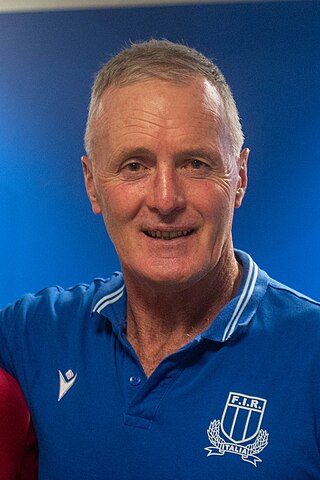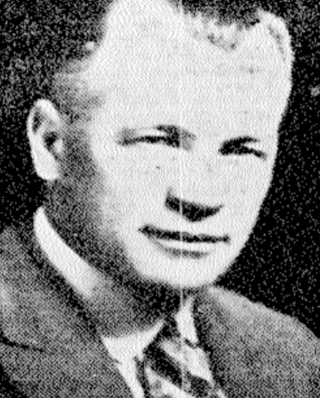Related Research Articles

The New Zealand Barbarian Rugby Club Inc., nicknamed the Barbarians, or Baa-Baas, is a rugby union club headquartered in Kingsland, Auckland. The idea came from the concept of the Barbarian F.C. The Barbarians played their home matches at Eden Park.

Sidney Milton Going was a New Zealand rugby union footballer. Dubbed Super Sid by his fans, he played 86 matches, including 29 tests, for the All Blacks between 1967 and 1977. He represented North Auckland domestically.

David Gallaher was an Irish-born New Zealand rugby union footballer best remembered as the captain of the "Original All Blacks"—the 1905–06 New Zealand national team, the first representative New Zealand side to tour the British Isles. Under Gallaher's leadership the Originals won 34 out of 35 matches over the course of tour, including legs in France and North America; the New Zealanders scored 976 points and conceded only 59. Before returning home he co-wrote the classic rugby text The Complete Rugby Footballer with his vice-captain Billy Stead. Gallaher retired as a player after the 1905–06 tour and took up coaching and selecting; he was a selector for both Auckland and New Zealand for most of the following decade.
Arthur Harold Collins, fullback for the All Blacks and for Taranaki (1927–1937), was born in Stratford, New Zealand on 19 July 1906. Weighing in at just 73 kg, and only 1.70m in height, Collins made a name for himself playing club rugby for Stratford and Clifton, and in 1927 was selected for the Taranaki Rugby Football team. He went on to make 81 appearances for Taranaki over the next eleven years, building a reputation as "a reliable last line of defence and an accurate goalkicker".”
The Taranaki Rugby Football Union is the governing body for rugby union in Taranaki, New Zealand and was established in 1889. Taranaki is a region of New Zealand that covers areas in the districts of New Plymouth, Stratford and South Taranaki. Taranaki Rugby's two most senior representative teams are the men's NPC side, Taranaki Bulls, and the women's Farah Palmer Cup side, Taranaki Whio. The union is affiliated with the Chiefs Super Rugby franchise. Their playing colours are amber and black and they play their home games at Yarrow Stadium in New Plymouth.
Mark Richard Allen, commonly known as Bull Allen, is a New Zealand former rugby union footballer and TV celebrity, reaching iconic status on the New Zealand sports scene in the 1990s. As well as 19 games and 8 test match appearances for New Zealand, Allen played 110 games for Taranaki and was captain of the inaugural Wellington Hurricanes Super 12 team. He was also captain of the first and short-lived Central Vikings team.

Gary Ross Freeman is a New Zealand former professional rugby league footballer who played in the 1980s and 1990s, and coached in the 2000s, who both captained and coached the New Zealand national team. He was arguably one of New Zealand's greatest Test halfbacks and at the time of his retirement he was the most-capped New Zealand test player and also held the record for most consecutive tests for New Zealand with 37.
The Cavaliers was an unofficial New Zealand rugby union team which toured South Africa in 1986. Because of the Apartheid policies of the South African government, the official New Zealand Rugby Union tour scheduled for 1985 was cancelled, and the Cavaliers tour was very controversial in New Zealand.

James Hunter was a rugby union footballer who played for New Zealand's national team, the All Blacks. He played mainly at second five-eighth, although he could play any position in the backline. He played for Hawera Club before being selected for Taranaki in 1898 and the North Island in 1904 before his first All Blacks selection in 1905. He toured with the 1905 All Blacks that travelled to Great Britain, France and North America. After returning he continued to be selected for the All Blacks until retiring after the 1908 season.

Kieran James Crowley is a New Zealand rugby union coach and former player, who is the former head coach of Italy. He has also coached the New Zealand Under-19s in the 2007 World Championships as well as coaching provincial side Taranaki. He previously served as head coach of Canada. He also spent five seasons coaching Benetton Rugby.
The 1980 New Zealand tour of Wales was a collection of friendly rugby union games undertaken by the New Zealand All Blacks against Wales that also took in two international games in North America en route to South Wales. This was a single test tour against each of the countries played, with four games against Welsh club opposition.

Vincent David Bevan was a New Zealand rugby union player.
The 1979 New Zealand rugby union tour of England, Scotland and Italy was a series of eleven matches played by the New Zealand national rugby union team in England, Scotland and Italy in October and November 1979. The tour was very successful as the team won ten of the eleven games, including the international matches against Scotland and England. The only team to defeat the All Blacks was the English Northern Division.
Mark William Donaldson is a former New Zealand half-back rugby union player. Donaldson played 35 matches, including 13 test matches, for the All Blacks from 1977 to 1981.

Beauden John Barrett is a New Zealand professional rugby union player who play as a fly half for Japan Rugby League One club Toyota Verblitz and for the New Zealand national team.

Jamison Ratu Gibson-Park is a professional rugby union player who plays as a scrum-half for United Rugby Championship club Leinster. Born in New Zealand, he represents Ireland at international level after qualifying on residency grounds. Gibson-Park received Irish citizenship in December 2023.

Hohepa Te Toiroa Tahuriorangi is a New Zealand rugby union player who currently plays as a half-back forTaranaki in the Mitre 10 Cup and the Crusaders in Super Rugby. In 2018 Tahuriorangi was selected to play for the All Blacks.
Peter Standish Burke was a New Zealand rugby union player, coach and administrator. A lock and number 8, Burke represented Bay of Plenty, Auckland and Taranaki at a provincial level, and was a member of the New Zealand national side, the All Blacks, in 1951, 1955 and 1957. He played 12 matches for the All Blacks including three internationals.
Arthur Larwill Humphries was a New Zealand rugby union player. Primarily a halfback, Humphries represented Taranaki at a provincial level between 1893 and 1903, playing 40 matches for the province. He was a member of the New Zealand national side in 1897, 1901, and 1903. In all, he made 15 appearances for his country, scoring 45 points, but missed selection for New Zealand's first Test match, against Australia in 1903. He went on to be the manager of the national side, by then known as the All Blacks, against the touring Anglo-Welsh side in 1908, and later served as a Taranaki selector and, in 1923, as president of the Taranaki Rugby Union.

Norman William Loveridge was the 141st New Zealand international rugby league player. He played one test for New Zealand against the touring England team in 1920 at fullback.
References
- ↑ "Puke Ariki - Taranaki Stories - Halfback Star Dave Loveridge". Archived from the original on 19 August 2006. Retrieved 4 July 2006.
- ↑ Knight, Lindsay. "Dave Loveridge". New Zealand Rugby Union. Retrieved 14 January 2018.